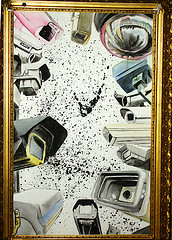 Years ago I became obsessed with Ezra Pound, the fascist poet, and so I was reading a magazine article about his stay in St. Elizabeth’s Hospital and there was a fuzzy photo of Pound in there and the caption read something like, “Paranoia: An Occupational Hazard of Sinologists.”
Years ago I became obsessed with Ezra Pound, the fascist poet, and so I was reading a magazine article about his stay in St. Elizabeth’s Hospital and there was a fuzzy photo of Pound in there and the caption read something like, “Paranoia: An Occupational Hazard of Sinologists.”
I was trained as a Germanist, so I speak from experience when hastening to add that a prolonged fixation on the Germans and their culture poses similar hazards.
That latter thought occurred to me as I considered the web not as a platform for free expression—even enabler of revolutions—but as a decentralized, massively intelligent surveillance device. A hybrid panopticon confessional.
We tend to think of the web as an amalgam of information. What if we saw it instead as an accumulation of evidence?
This is what happens when your communication system grows a universal memory. Anything that can exist as an electronic file can be connected to every other electronic file. And every communication across the network becomes/produces electronic files. Imagine a total catalog of an entire sphere of human communication, a sphere actually enclosing/encompassing it.
And speaking of the evolution of the human psyche and the impact of environmental factors thereupon, with every experience we are building a sense of what can possibly happen. So, what is the proper pace for world-building?
The internet exposes us to an insanely broad world of experiential possibility—indeed, it offers the greatest wealth of possibility individual human beings have ever encountered in the long lifetime of our species. These possibilities can, in their extremity, be shocking and disturbing to people, though not so much due to their graphic content, but rather because exposure to them accelerates, and in a painfully unidimensional manner, the intra-psychological process of world-building, producing, ultimately, a painful, homeostatic disruption.
Never fear. We still have lives, the vast bulk of which will never leave a trace in this world wide web. Or, rather, only leave traces, nothing more. What is captured by the web is often only circumstantial evidence, after all, merely the trace.
Our actual lived experience, phenomenologically speaking, never crosses the threshold except as description, depiction or expression. In other words, never as the thing itself.
And, in this way, Kant’s uncrackable kernel (the echo of Leibniz’s) becomes our last, inscrutable refuge.
Image Credit: dirtybronson.
